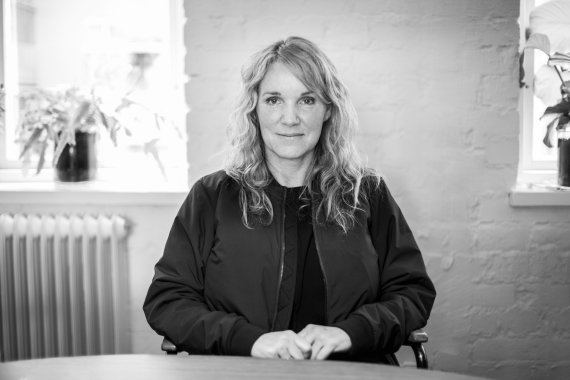
My name is Eva Karlsson. Since 2001 I have been CEO of the Swedish outdoor brand Houdini, based in Stockholm. A fast-growing outdoor company and trailblazer in corporate responsibility.
With a team of like-minded people, we are pioneers in the development of circular and regenerative business models with the ultimately target of re-establishing a closer and more mindful connection with nature. On the way there, we have already achieved a lot and shifted boundaries: and yet I still see a lot of untapped potential and the enormous value that the design of attractive and regenerative lifestyle solutions offers.
Why a shift of mindset in the industry, society and simply of every individual is so important for this, why cooperation is just as essential for all of us as well as for successful future orientated business, is what I write about in my guest article.
We, as a company, want to become a positive and regenerative force in society and for the planet. We want to work 100% circularly, just as nature, our inspiration and role model, does. For this mission, we have taken up the challenge to be uncompromisingly committed to entrepreneurship with a positive impact on the planet.

To drive that change in a bold and effective manner we need to have a broader perspective and mindset. And the transition that we are undertaking requires collaboration. In that sense my biggest challenge is finding common ground. For instance: What is the purpose of business? And what is the opportunity for an outdoor brand in the here and now – the world we find ourselves in?
Today the definition of value creation seems to be very narrow in terms of only looking at financial values: but that is not meaningful and relevant enough anymore and it doesn’t engage our customers and our employees or anybody else.
Much higher ambitions that are more visionary and positive in terms of shifting from bad to good are requested: how can we contribute to our customers, individuals and to the planet? This is where our mindset needs to be. And this will increase the energy and acceleration of our changing world into the right direction.
Customers are starting to expect much more of companies than they used to. Employees or young people moving into business and even people who have been working for many years start considering now: Is this what I am supposed to do with my life? Is this meaningful? They start to question the company they are working for, or they might get the opportunity to become an activist for changes.
There are several pressures nowadays. But it’s not the ones in power who are putting that pressure on companies or governments, it is people with less power. And it is a movement that will accelerate and probably grow exponentially.
If you are in a power position today, for example like me as a CEO, take your time to reflect and question: Are you working towards something that is relevant – from a human perspective? If it is not meaningful for us, as an individual and human being, it will probably not be relevant for our customers and employees tomorrow – or even today.
If a company tries to avoid these facts, not realizing that there is the urgent need to do things differently, there will be no room for that company in the future, I truly believe. But when we start figuring out solutions now that have a positive contribution for individuals, society and the planet, we create a strong "place to be". It attracts customers, employees, and cooperation partners.
Though, it is survival mode in a sense to question relevancy, but it is also a significant journey to embark on. I have done it…and it is incredible: It is the adventure of my lifetime!
Shifting of mindset is one thing, the second thing needed is collaboration to really make the shift happen. Nobody can make the journey of changing from degenerative to regenerative on their own, especially on that society level and that extent. We as Houdini can design our products in a certain way, communicate in a way that distributes knowledge rather than campaigns, we as a lifestyle brand can communicate that it is cool to repair and not only fall in love with a product but also stay in love.
To reach positive tipping points moving towards alternative sustainable ways of technologies, materials etc. requires collaboration outside Houdini. Furthermore, there are other challenges that we need to have the entire society engaged in, for example the energy system, transportation system and also how we measure success and value creation.
Of course, the message that competition is everything has been pushed for over more than the last two centuries. And we would never have come as far as we have without competition, I agree. But competition is only a spice on top. Since humans arrived on this planet, collaboration has been the most important aspect and the foundation for human prosperity. We still have it within us: we just need to go back to that winning spirit of collaboration. And I don’t want to think about an alternative, because this would be the end.
The comfort of staying in the currently known and status quo might be a hindrance for change. And it is also human to be afraid of the unknown. But these are not the times to remain in a comfortable, familiar state whilst society and the planet are transforming at such a speed around us. Change is coming whether we like it or not - we better start to work!
I think in a sense it is also difficult to have an honest perspective on the effects of a company and this can be a barrier in the process. We tend to use the most beautiful marketing words describing our sustainability work and we may be trying not to talk about things that should have been done but weren't. All this sets us back in the positive transformation process. It’s important to overcome this obstacle because a transparent, honest, and trustworthy communication enables us to have a much stronger connection with our customers and ourselves.
We as a society are used to working very specifically on one specialist area – maybe without any insights into the broad systemic effect our actions could have on our ecosystem or society. So, from a system perspective this is also a change that needs to happen: We all need to get to know a better systemic understanding of the interconnectedness of nature.
I experienced that everything we are doing differently might be positive for sustainability… and at the same time it is also a much smarter way of doing business. We are realizing that there is so much untapped potential in the way that business has been operated for decades. Exploring this field is a really creative process where you can figure out amazing opportunities that you didn’t see before. I truly believe that every company should do that.
One example: We have done an innovation project where we started with eliminating micro plastic. While exploring this challenge and taking a more systemic perspective we were not only able to solve that particular task, but also improved a lot of other things: For instance, a business model that we didn’t think about before and an engineering process that makes the end product and the fabric way better.

When we have common challenges it’s incredibly easy to realize that it is better to collaborate rather than compete. But there are challenging circumstances as well, the lack of trust for instance: How do we know that we can share something whilst not sharing everything? Integrity is also a point. The easiest way to start collaboration might be to work with somebody from a different business sharing relevant common ground.
Moreover, true innovation needs to happen together with specialists. And if it is crosspollination in between sectors and disciplines we find that necessity to be even stronger. We also collaborate with earth scientists, working in an entirely different territory. Those types of collaboration are absolutely marvellous.

There is for sure circularity in the way that we can have resources flowing rather than being linear and we can have business models where products can be shared.
Another very important aspect of cooperation is the sharing of knowledge. I guess that is how nature works: With feedback loops and distribution of knowledge. With open-source projects we can do that too. It doesn’t make any sense to keep a technology that is meant to eliminate microplastic for ourselves: it has to be shared.
Considering that our customers love nature just like we do, we as the outdoor industry could be the ones that move the needle and really go ahead with speed towards a new way of doing business: a regenerative unstoppable force. That’s an opportunity that we haven’t grasped as an industry, yet. And that takes collaboration for sure.

If you think about the heatwaves, the climate and biodiversity it is obvious that we have to react now. So many of us are doing business as usual, governments are slow in changing regulations. But we don’t have time.
And if we’re looking at the situation from a perspective of possibilities and see what we can create together it will not be such a big burden – it becomes more of a joyful community-project. The adventure of our lifetime! It is up to us to make sure that next generations have a future that is worth living in and maybe we can create a world for them that is probably even better than today.
A philosopher said: All we need in life is knowledge, love and beauty. And I agree and would add hope: Hope comes from the way of thinking that a shift of mindset is possible, that collaboration is the way forward and we can naturally do that.

 Sports BusinessDisruptive marketing - changing the outdoor industry
Sports BusinessDisruptive marketing - changing the outdoor industry
- Awards
- Mountain sports
- Bike
- Fitness
- Health
- ISPO Munich
- Running
- Brands
- Sustainability
- Olympia
- OutDoor
- Promotion
- Sports Business
- Textrends
- Triathlon
- Water sports
- Winter sports
- eSports
- SportsTech
- OutDoor by ISPO
- Heroes
- Transformation
- Sport Fashion
- Urban Culture
- Challenges of a CEO
- Trade fairs
- Sports
- Find the Balance
- Product reviews
- Newsletter exclusive area
- Magazine




